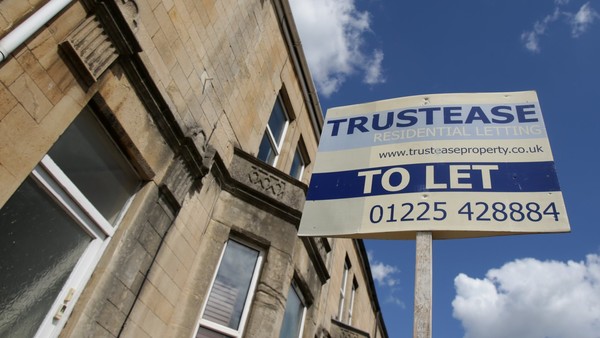Landlords in UK avoid George Osborne’s buy-to-let curbs
12-06-2015
James Pickford
BATH, ENGLAND - MAY 13: A 'To Let' letting sign is seen displayed outside a rental property in an area that is popular for buy-to-let properties on May 13, 2014 in Bath, England. The Labour party has announced that if it wins the election it would cap rent increases in the private sector and scrap letting fees to estate agents. (Photo by Matt Cardy/Getty Images) ©Getty
George Osborne’s attack on the £60bn buy-to-let industry has sparked a surge in landlords buying property through a company in order to safeguard tax reliefs.
Mortgage applications via a limited company, made through the lender Kent Reliance, trebled in September compared with the same month in 2014 — the lender’s highest level on record, according to its annual report, “Buy to Let Britain”.
Across the whole market, an average of 5,000 mortgages per month were issued through companies in July, August and September, up from 2,500 a month a year earlier. The total rents collected by landlords surpassed £5bn a month, it said.
Incorporation allows landlords to avoid the cuts to tax relief on mortgage interest unveiled by the chancellor in his Summer Budget. These will be phased in between 2017 and 2020 and will limit to 20 per cent the relief available to individual buy-to-let owners, down from as high as 45 per cent.
“Our data show the number of applications via limited companies saw an immediate impact from the Budget, with 40 per cent more applications of this type in July than a year ago,” said the lender.
It was not the only broadside Mr Osborne has launched against buy-to-let this year: in his Autumn Statement last week he piled on the pain with a 3 percentage point surcharge on stamp duty land tax for buyers of buy-to-let or second homes, effective from next April. The National Landlords Association, a representative body, suggested the chancellor wanted to “completely eradicate buy-to-let in the UK”.
The chancellor has also targeted the growth in the use of offshore companies to buy residential property. Mr Osborne has imposed an annual charge on homes held in this way and announced new rules preventing non-domiciled people who held property in an offshore structure from using the arrangements to avoid inheritance tax.
Researchers said it was too early to identify effects of the stamp duty changes on the market, but since the government was consulting on exempting corporate structures with more than 15 properties, the trend towards incorporation was expected to accelerate next year.
The report added that landlords might choose to form joint companies to pass the 15-property mark.
John Eastgate, sales and marketing director at OneSavings Bank, said there would be a rush to buy before April. He said: “With the stamp duty changes coming on top of the tax changes from the Summer Budget, we are potentially facing a first-quarter bubble in terms of the volume of buy-to-let transactions done through a limited company.”
Incorporation for a new property purchase may make sense. But tax experts have warned owners to be wary of switching an existing property held in an individual’s name into a corporate entity. A switch would require a sale and purchase, triggering capital gains tax and stamp duty that could wipe out the savings from incorporation.
The lender’s annual survey of private renting also produced more evidence of the sector’s rapid growth. In September, the monthly rental income collected by landlords rose beyond £5bn, up 17.9 per cent on a year earlier.
Estate agents say surcharge will lead to higher rents and deter new landlords from entering market
Almost two-fifths of this total was accounted for by London, which is a rental hotspot because of its more transient workforce. This is followed by south-east England, with 13.8 per cent, and the north-west with 8.1 per cent.
Wages have been growing in recent years, but rents have outstripped them. Since the recession, average wages have risen 15.6 per cent, but rents have gone up by 26.7 per cent over the same period, Kent Reliance found. Across all households, the average rent in the UK private sector is now £897 a month.
The value of properties in the private rented sector has climbed by £171bn in the past year to reach £1.2tn. Half of this growth in capital value is down to house price growth and rental housing expansion in London.
In spite of the disruption Mr Osborne’s reforms are causing in the buy-to-let market, Mr Eastgate felt their overall thrust was likely to be positive. He said: “If these tax changes make amateurs think twice about entering the buy-to-let market and encourage professional landlords to invest, that’s probably not a bad thing.”
Copyright The Financial Times Limited 2015. You may share using our article tools.
Please don't cut articles from FT.com and redistribute by email or post to the web.


